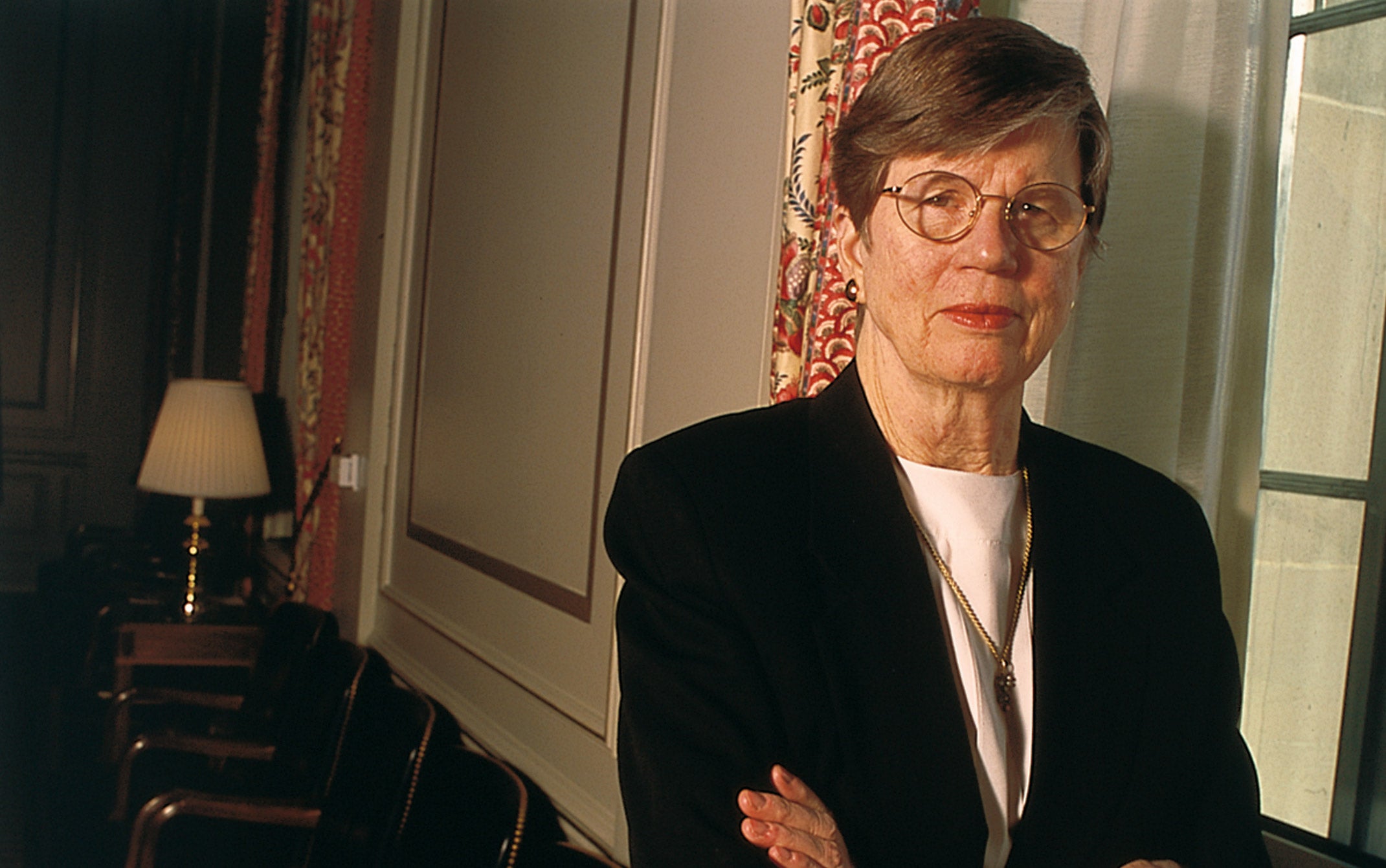Janet Reno ’63, the longest serving U.S. attorney general of the 20th century and the first woman to have ever held the post, died on Monday at age 78, from complications of Parkinson’s disease.
Reno was nominated to the post of U.S. attorney general by President Clinton in 1993 and she served for eight years before stepping down in 2001. Previously, she served five terms in her native Florida as state attorney for Dade County (now Miami-Dade County), where she was the first woman to serve in that role.
Said Harvard Law School Dean Martha Minow: “Janet Reno was in many ways a maverick — a formidable lawyer and leader who forged her own path, stayed true to her values of integrity and independence, and stood up to power when necessary. She was the rare public servant who took full responsibility for her own decisions and for the actions of subordinates in tough moments, and gave credit to others in moments of triumph. She was among the earliest women to graduate from Harvard Law School, and her steadfast determination to be a full participant in the legal profession paved the way for countless women who followed in her wake. The longevity of her tenure as Attorney General reflects her remarkable strength, including her ability to withstand political pressure and constant scrutiny of the most intense kind. Her legacy includes the aspiration to keep law enforcement separate from politics and to use the power of the government to support the powerless, including children and others in need of help. We are deeply proud of her, and we will always remember and cherish her many acts of kindness during her visits to Harvard Law School over the years.”
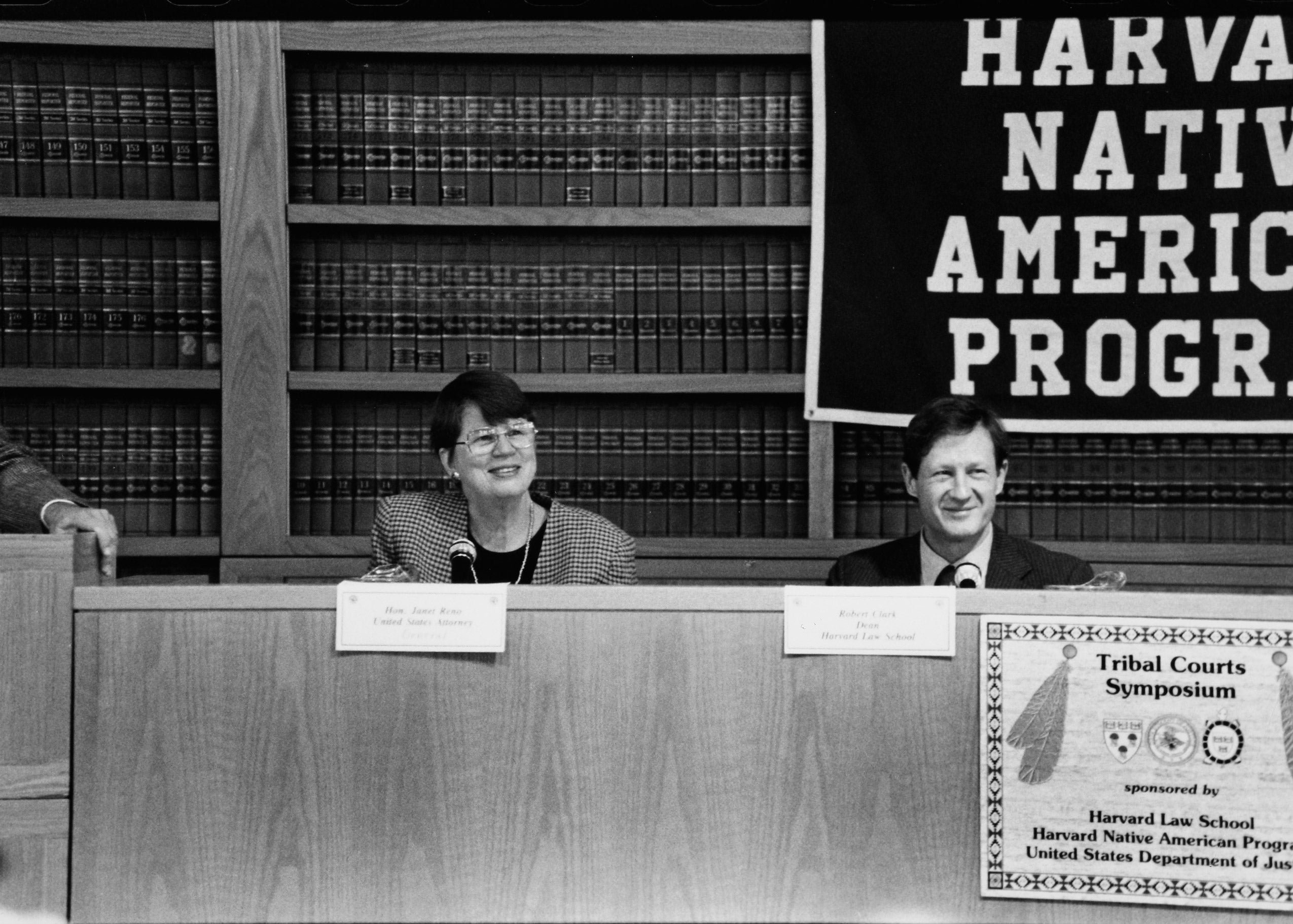
In a 2001 interview in the Harvard Law Bulletin, Reno recalled the obstacles she faced in pursuing her law degree. Her mother, Jane Reno, initially didn’t want her daughter to go to law school. She forbade Janet, a teenager at the time, from becoming a lawyer, saying that men were better suited to the profession. Reno chose to study chemistry as an undergraduate at Cornell, intending to pursue a career in medicine, but after receiving her bachelor’s degree, she decided to apply to Harvard Law School.
When Reno enrolled at HLS in 1960, she was one of only 16 women in a class of more than 500 students. The dean of Harvard Law School at the time, Erwin Griswold ’28 S.J.D. ’29, told Reno and the 15 other women in the class, “I don’t know what you are going to do with your Law School education.” Reno later said Griswold did offer support and encouragement to her over the years. After becoming attorney general, when she spoke at an event that Griswold attended, Reno said: “I had told the story about what he had said, [that] he didn’t know what we were going to do with our Law School education, and I said, ‘I hope I’ve answered your question, Dean.’”
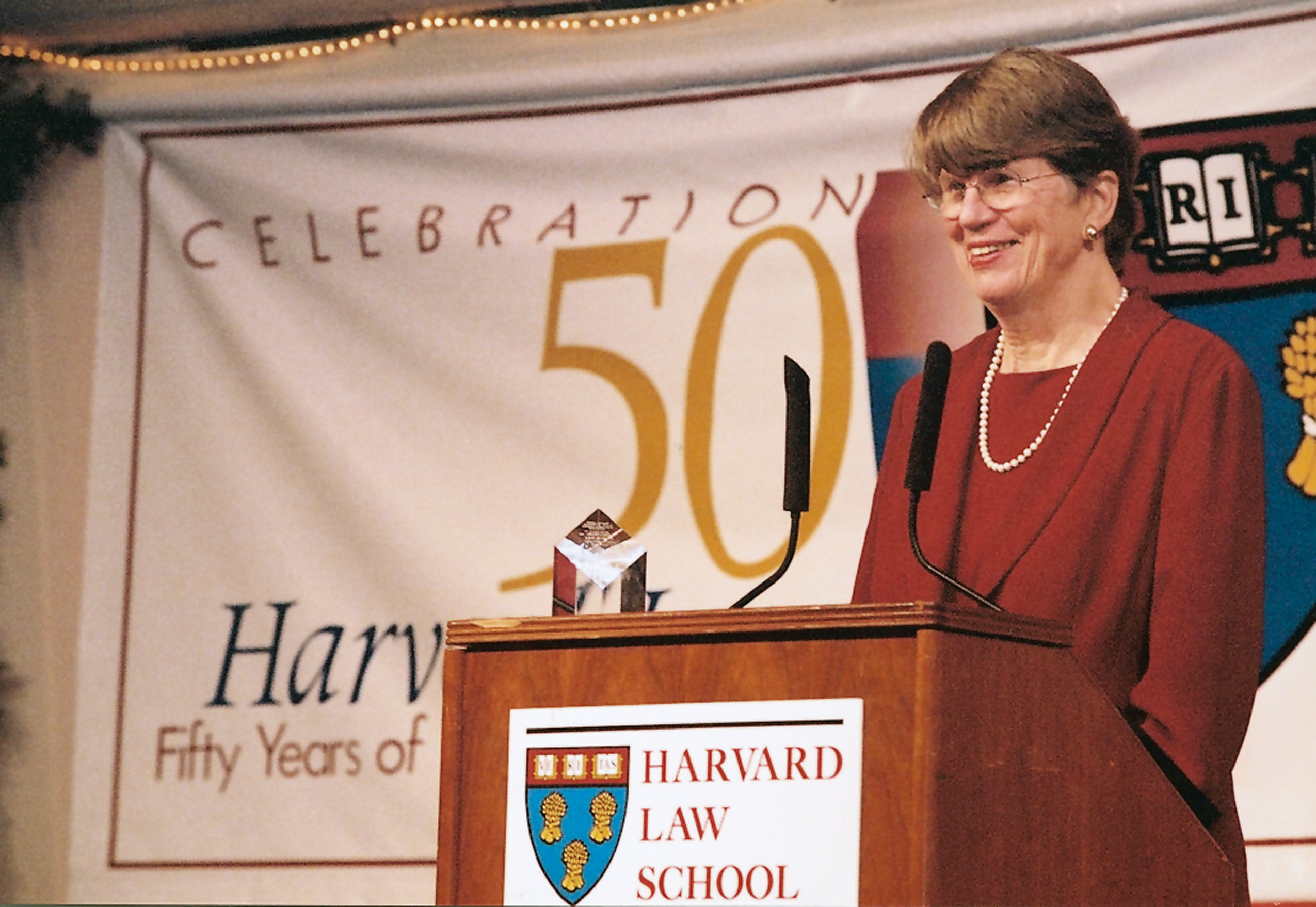
After graduating from HLS, Reno faced a difficult job search because of her gender. A large Miami firm turned her down for a job because she was a woman. But she eventually found a position in another firm and worked in private practice until 1971, when she became staff director of the Judiciary Committee of the Florida House of Representatives. She later served as counsel for the Florida Senate’s Criminal Justice Commission for Revision of the Criminal Code and assistant state attorney for the Eleventh Judiciary Circuit of Florida. In 1978, Florida Governor Reubin Askew appointed her state attorney for Dade County, a position she held through four elections and for 15 years.
In the 2001 HLS interview, Reno spoke about her career, which was sometimes roiled by controversy and tragedy, including the deadly raid on the compound of the Branch Davidians cult in Waco, Texas, and the highly politicized return of five-year-old Elian Gonzalez to Cuba. During her tenure, she also oversaw the convictions of Sheik Omar Abdel-Rahman, the spiritual leader behind the 1993 World Trade Center Bombing, and Timothy McVeigh and Terry Nichols, who were responsible for the 1995 Oklahoma City bombing. Despite the challenges she faced during her tenure as attorney general, she said her work was always defined by the resolve to uphold the rule of law.
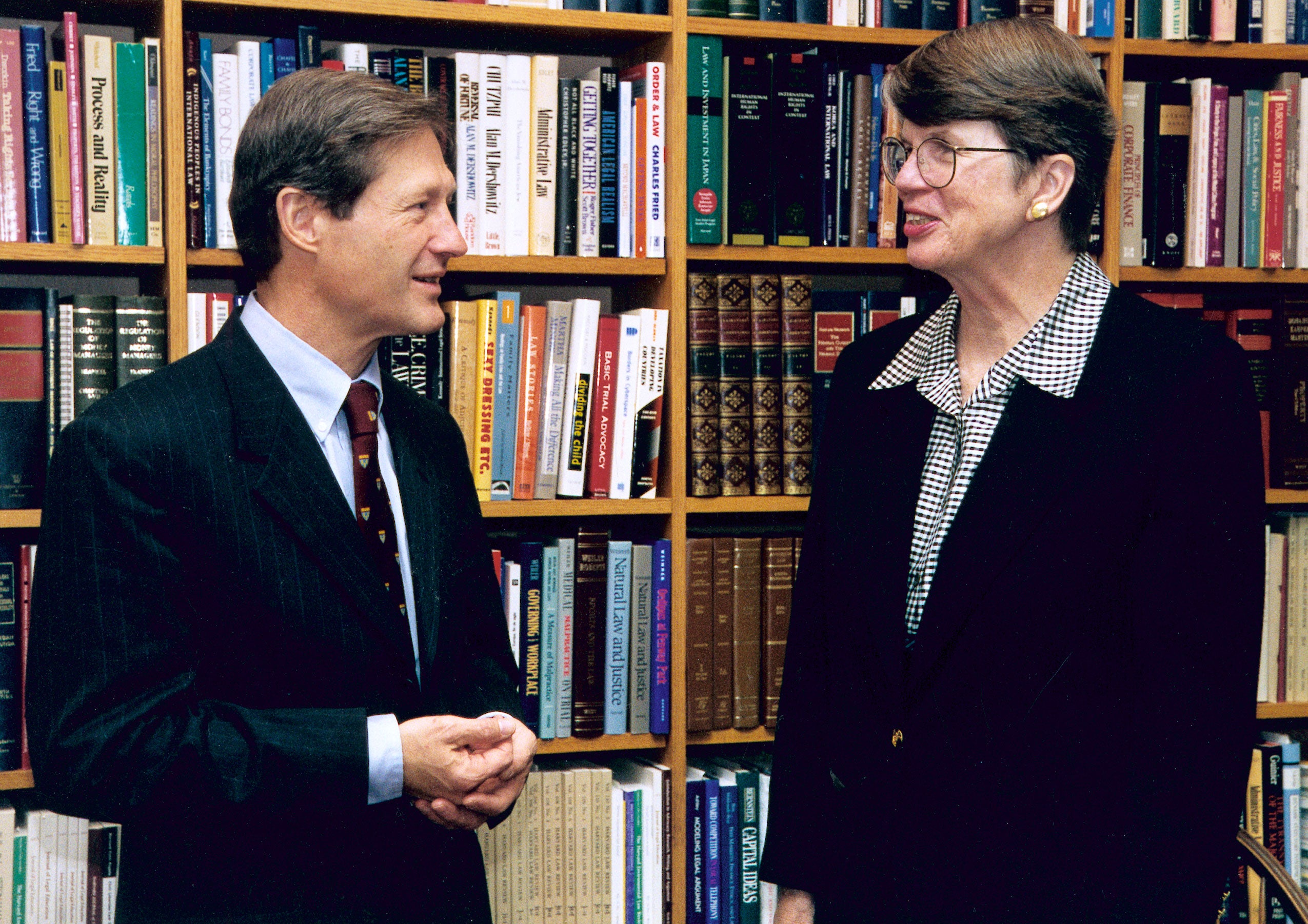
Throughout her career, Reno emphasized reforming the criminal justice system, as she had done when she spearheaded the creation of drug courts as state attorney for Dade County, Fla., and providing education and health care to children to stem societal violence.
She also preached the need to serve the public. In 2002, Reno ran for governor of Florida after returning to her home state from Washington, D.C. She lost, but as she told an audience when she accepted an award at HLS, “If people won’t run for political office because they think it’s beneath them, then democracy is at risk in this world.”
In an article in NPR, Jamie Gorelick ’75, a partner at WilmerHale who was Reno’s deputy attorney general from 1994 to 1997, said: “She was the least air-brushed candidate we have ever had for a Cabinet-level position. She was herself, and she didn’t change herself for Washington.”
Reno returned frequently to Harvard Law School. In 1999, she delivered a keynote address for an alumni event. She told the gathering: “Harvard Law School has meant so much to me. It taught me to use law to help others. I loved the law when I graduated. But now, after five and a half years as attorney general, I love it even more. I am in awe of its magnificence, and alert to its vulnerability and fragility. People have talked about the discouragements of public service—and these years have been extraordinarily challenging … [Y]ou get cussed at, spoken to with contempt and disgust. Yet I wouldn’t trade the experience for anything.”
Reno frequently declined to reflect on her legacy, believing it was for others to decide. But in the 2001 HLS interview, she said one of her proudest accomplishments was taking care of her mother when she was dying of cancer and making her comfortable until the end. Her mother died in December 1992, a few weeks after Bill Clinton was first elected president — and just a few weeks before her daughter was nominated to be the nation’s first woman attorney general.
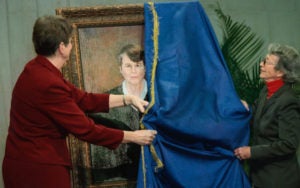
At Harvard Law School, many remember her gentle, unassuming manner and especially her kindness and compassion. Donna Chiozzi, former director of alumni affairs, who helped organize alumni reunions and gatherings for more than 25 years, recalled: “When back in Cambridge for an event, she asked if I might drive her around her old haunts — Inman Square. She wanted to see the house she lived in when a student, and how the area might have changed. She shared old memories. We had a wonderful time together before we were off to the airport. My sweetest memory, however, was during another visit. She always asked about [my] mom and always reminded me how close she was to hers. I told her mom was at home recovering after a lengthy stay in hospital. Without hesitation, she asked if I would take her home to visit. A bit surprised, off I went to Medford, with the attorney general in tow, to spend time with mom and dad. I will never forget her kindness, her gentleness.”
Robb London ’86, a former assistant U.S. attorney in Seattle, recalled: “She cared tremendously about the impact of crime on children, and about using the law and the power of her office to protect the youngest and most vulnerable members of society. On her last site visit to the Seattle office as AG, she asked to speak with me because I had volunteered to prosecute the ‘deadbeat dad’ cases that she knew were not glamorous. Aware of how many non-paying fathers were evading their court-ordered obligation to pay child support by moving to other states, she made it a priority to go after them through federal law enforcement — to plug a hole that the states couldn’t plug as easily beyond their own borders and jurisdictions. These were hardly career-making cases, but she looked me in the eye and said, ‘These are some of the most important cases we can bring, and I am deeply grateful for the work you put into this.’
“She was already suffering from Parkinson’s, but she extended her hand — a huge effort because of the tremors — and said, ‘I want to shake your hand to say thank you from the bottom of my heart.’”
Read more coverage:
New York Times: Janet Reno, First Woman to Serve as U.S. Attorney General, Dies at 78
NPR: Janet Reno, First Female U.S. Attorney General, Dies At 78
Washington Post: Janet Reno, former U.S. attorney general, dies at 78
